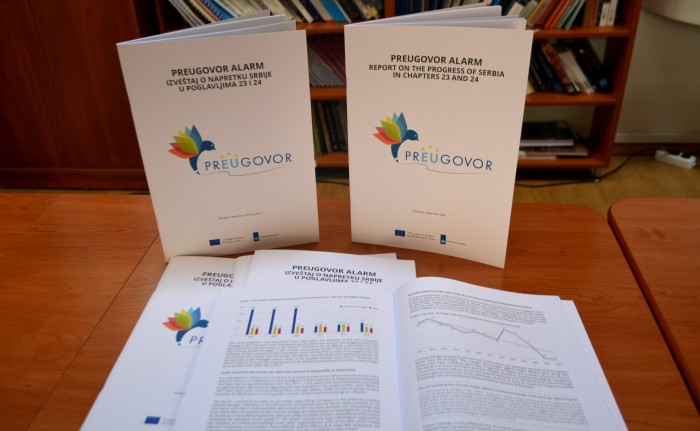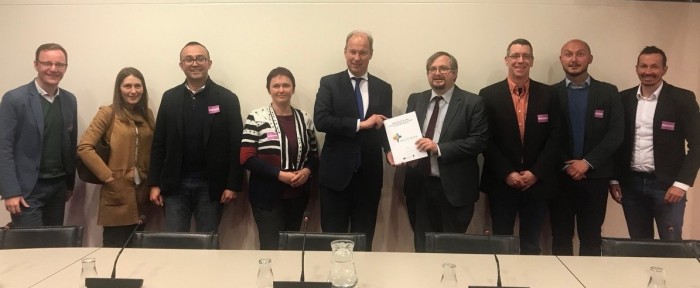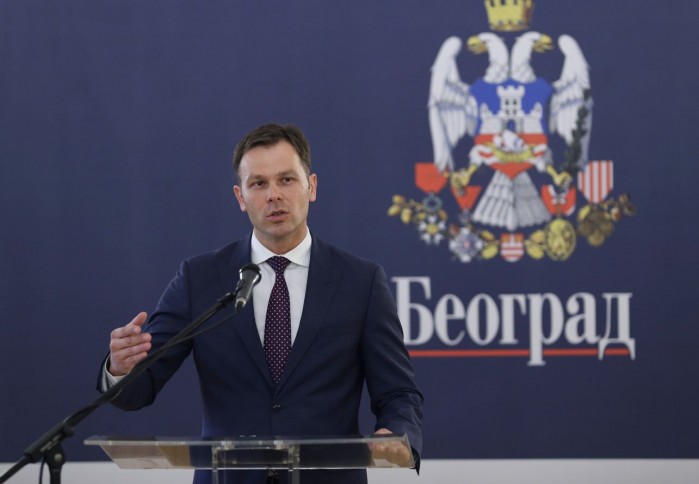State capture erodes citizens’ rights in Serbia and represents the main obstacle on the path towards the EU, it was concluded at the presentation of the newest independent report of coalition prEUgovor about progress in chapters 23 and 24, held on the 25th of October 2018 in Belgrade.
State capture implies exhaustion of public resources for private interests, instead of using them in the purpose of common good, Belgrade Centre for Security Policy (BCSP) Researcher and discussion moderator Bojan Elek explained.
“This problem pervades many social spheres and demands urgent reaction,” Elek emphasized.
Bobana Macanovic from Autonomous Women’s Center (AWC) pointed out the erosion of the women’s rights that is reflected in the draft laws, and also financing of the National SOS helpline.
“Proposed law on free legal aid, beside the fact that is expensive, would lead to the discrimination of NGOs’ employees, as well as some categories of jurists that are providing free legal aid”, said Macanovic.
Example of Draft Law on Gender Equality shows how wide public discussion is used to simulate dialogue, said Macanovic, and emphasized that out of the many comments delivered the majority of accepted ones are those made by the right oriented organizations, which shows political orientation of the state. AWC representative stated that Draft Law prepared by Coordinating Body for Gender Equality should be brought back.
Macanovic reminded of three competitions of Ministry of Labour, Employment, Veteran and Social Affairs for means intended for functioning of National SOS helpline, and then emphasized that legally it is not meant to conduct the competition, but public procurement. Two of the competitions had failed, and the third one is enabled by Government conclusion that suspended an article of the relevant law, Macanovic stressed.
“Our society is in a serious problem. We don’t need laws and National Assembly if decisions will be made by Government conclusions. European Commission should insist on the new solutions that are better than previous ones, rather than ’checking off’ adoptions of new laws”, Macanovic emphasized as the main suggestion of the AWC.
Nemanja Nenadic from Transparency Serbia (TS) looked back on the question of corruption in the context of chapters 23 and 24, pointing out that recommendations of the prEUgovor Alarm were recurring because they hadn’t been implemented previously. Warning that it is not important just to adopt a law, but to think about its content, he analysed Draft Law on Public Procurement. Nenadic emphasized that anti-corruption items were constricted comparing to the law from 2012 and warned that solutions of the Draft Law on Anti-Corruption are worse than ones in the text suggested in the October 2017.
“There is no progress in dealing with the state of public companies and state administration. Only 30% of employees were chosen through competition”, stated Nenadic.
Nenadic said that he supports opening of every new chapter of Serbia-EU accession negotiations, but that he expects from EU to send stronger messages to the authorities in areas where there are no positive results.
BCSP Researcher Jelena Pejic warned of the existing inconsistencies in the security sector. As a key issue, she emphasized the possibility that the adopted legislation will “seal state capture.”
"The concentration of power is growing, and most of it is in the hands of political employees. The discretion of political power is also reflected in the management of human resources in the area of employment. The fact that the President of the Republic assumes the role of the Government in the management of the national security system points to the blurring of the division of responsibilities," Pejic underlined.
The adopted amendments to the law on military, Serbian Information Agency (SIA) and the police, as well as the draft strategies on national security and defence are part of this trend, Pejic pointed out.
Opportunities for surveillance of citizens by security bodies and services are also growing. A wider circle of persons can be subjected to security checks under the Law on Police, and control over economic and scientific activity is growing, justified by the interests of the defence, Pejic said and explained that the Ministry of Defence must approve all "defence-related" research financed from abroad. In the context of the introduction of the concept of total defence in the text of the main strategic documents, it can be widely interpreted, Pejic concluded.
"With the passive National Assembly and an active but constantly undermined Commissioner for Information of Public Importance in the performance of duties, the process of control over the entire security sector is rendered completely meaningless. The new National Security Strategy threatens to further deepen all these trends," Pejic summed up.
As a recommendation, Pejic proposed the preparation of the special report for Serbia and all the countries of the region, according to a model that the European Commission has applied in Macedonia (Priebe Report). Unlike regular annual reports, this report was written in a direct language without diplomatic verbiage, written by independent experts, with concrete recommendations, whose application is closely monitored, Pejic concluded.
Summarizing the findings, Elek underlined that the shrinking of civic space in Serbia has reached an alarming situation. In this context are also announced changes of the Law on Information of Public Importance, as well as direct attacks on members of the media.
"The labelling of civil society organizations as a ‘destabilizing factor’ in Serbia that is working in harmony with foreign secret services is increasingly omnipresent," Elek concluded.
The conference is part of the project "Public policy oversight: PrEUgovor is overseeing the reforms in chapters 23 and 24", funded by the European Union. The conference was supported by the Embassy of the Kingdom of the Netherlands, within the MATRA program.
ABOUT PREUGOVOR
Coalition prEUgovor is a network of civil society organizations established to monitor policies related to the negotiations on Serbia's accession to the European Union, with special emphasis on Chapters 23 and 24. The purpose of the PrEUgovor is to help the EU accession process to be used to achieve substantial progress in the further democratization of Serbian society.
Members of the PrEUgovor are: ASTRA - Anti trafficking Action, Autonomus Women's Center (AWC), Belgrade Centre for Security Policy (BCSP), Center for Applied European Studies (CAES), Center for Investigative Reporting in Serbia (CIRS), Group 484 and Transparency Serbia (TS).
The main product of PrEUgovor is the semi-annual report on Serbia's progress in chapters 23 and 24, and the coalition is also published by rEUformator - a monthly newsletter dedicated to developments in Serbia and the EU in the areas covered by these two chapters.
You can follow PrEUgovor activities on the site, facebook and twitter.



